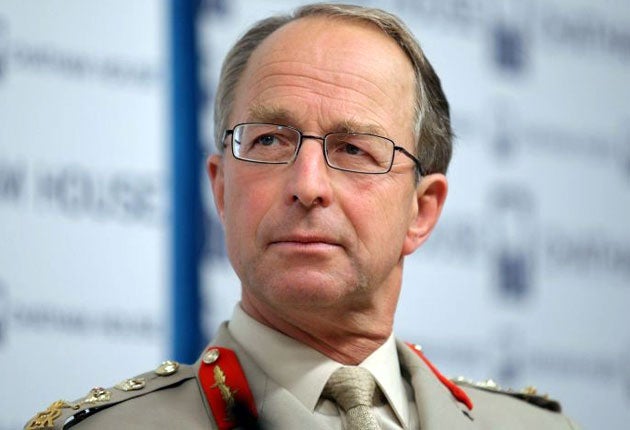The British forces chief during David Cameron’s Libya campaign claims his doubts were seen as ‘unhelpful’
Lord David Richards is calling for a change in the way the National Security Council operates

Your support helps us to tell the story
From reproductive rights to climate change to Big Tech, The Independent is on the ground when the story is developing. Whether it's investigating the financials of Elon Musk's pro-Trump PAC or producing our latest documentary, 'The A Word', which shines a light on the American women fighting for reproductive rights, we know how important it is to parse out the facts from the messaging.
At such a critical moment in US history, we need reporters on the ground. Your donation allows us to keep sending journalists to speak to both sides of the story.
The Independent is trusted by Americans across the entire political spectrum. And unlike many other quality news outlets, we choose not to lock Americans out of our reporting and analysis with paywalls. We believe quality journalism should be available to everyone, paid for by those who can afford it.
Your support makes all the difference.The general who headed the British military as it led David Cameron’s ill-fated Libyan intervention has said he was seen as “unhelpful” when he raised doubts about it.
Former chief of the defence staff Lord David Richards said once it became clear that the Prime Minister was set on his course, he “got on and did what I was told”.
Lord Richards said that the UK’s National Security Council structure that pushed the intervention forward was flawed and lacked “rigorous analysis”.
It comes as a damning report by MPs condemned the 2011 military campaign for lacking both “accurate intelligence” and a coherent strategy for the aftermath of removing the dictator.
Lord Richards said the campaign, which preceded the overthrow of Colonel Gaddafi, was a military success but that he was “always doubtful” about what would happen after.
Asked whether he raised those doubts at the NSC, he told the BBC: “I did.
“I was seen to be unhelpful, but in a way that was my job – to make sure that my political masters had thought through all the implications.”
He added that he then “got on and did what I was told” after the Prime Minister and Cabinet were sure of the legal case for the intervention.
The general, who sits in the House of Lords as a crossbencher, said the NSC system is “a little bit too neat in the way it operates”.
He went on: “I suspect, and quite naturally, the Prime Minister will come into the committee having made his mind up broadly what should happen and then we tweak at the edges.
“I think probably we need a more rigorous analysis in committee in order to make sure that initial analysis is right, I don’t myself think that probably happened.”
The Foreign Affairs Select Committee report published today concluded that: “Through his decision-making in the National Security Council, former Prime Minister David Cameron was ultimately responsible for the failure to develop a coherent Libya strategy.”
The disastrous results were “political and economic collapse”, tribal warfare, the refugee crisis, widespread human rights abuses and the rise of Isis in North Africa, fuelled by weapons abandoned by the Gaddafi regime.
A Foreign and Commonwealth Office spokesman said: “The decision to intervene was an international one, called for by the Arab League and authorised by the United Nations Security Council. Muammar Gaddafi was unpredictable, and he had the means and motivation to carry out his threats. His actions could not be ignored, and required decisive and collective international action. Throughout the campaign we stayed within the United Nations mandate to protect civilians."
Join our commenting forum
Join thought-provoking conversations, follow other Independent readers and see their replies
Comments